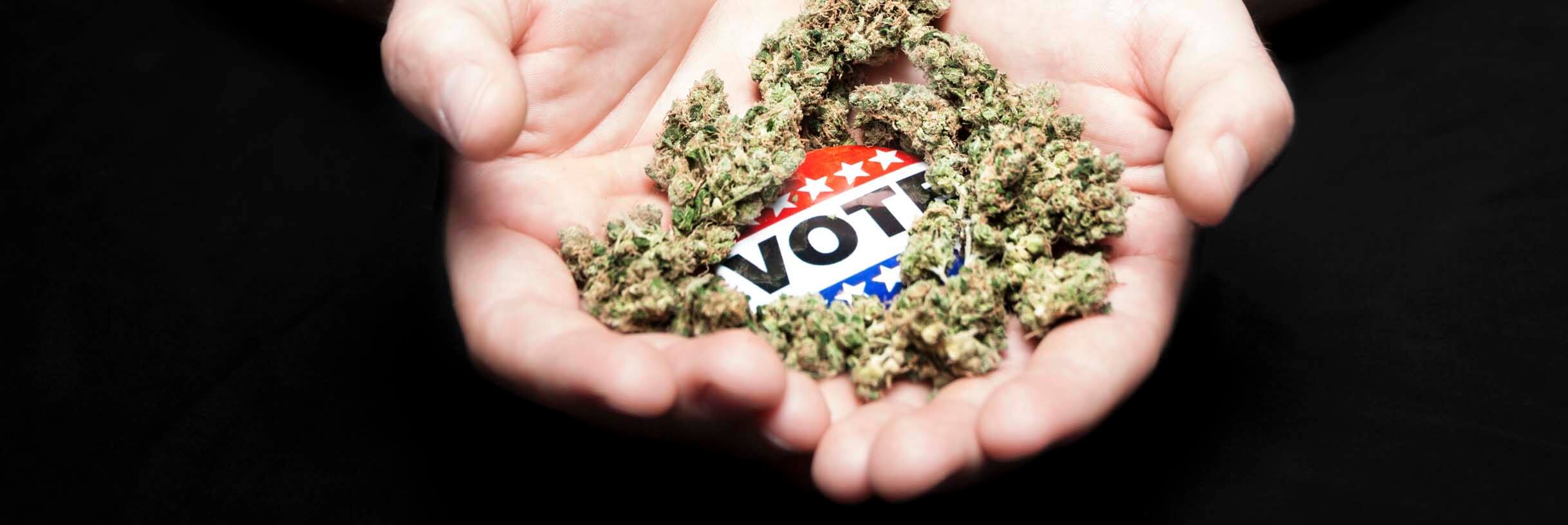
Voters in nine states will soon decide whether to legalize medical or recreational marijuana, and many polls are projecting marijuana access to reach an all-time high following the Nov. 8 election.
As many as 29 states could support some form of legal marijuana after Election Day.
Arizona, California, Maine, Massachusetts and Nevada will vote on whether to legalize recreational marijuana. Voters in Florida, Arkansas, Montana and North Dakota will decide whether to legalize medical marijuana for people with certain health conditions.
If recreational measures are approved in each state voting on the matter, nearly 60 million more Americans will live in marijuana-friendly states.
Recreational Marijuana
In California, Proposition 64 would legalize recreational marijuana use and possession of up to 28.5 grams of cannabis and up to eight grams of concentrated marijuana oils, commonly known as wax. The proposition would also allow adults in California to cultivate up to six cannabis plants for personal use.
According to a September poll from KPIX 5, a CBS affiliate, 52 percent of California voters support recreational marijuana legalization.
Arizona’s Proposition 205 would legalize recreational marijuana use, cultivation and sales. According to a recent Arizona Republic/Morrison/Cronkite News poll, 50 percent of registered voters in the state support legalization.
In the northeast, Maine and Massachusetts will vote on recreational marijuana legalization. In Maine, 50 percent of voters favor marijuana legalization, 41 percent oppose it and 9 percent are undecided, according to a recent poll conducted by The Survey Center of the University of New Hampshire. In Massachusetts, 55 percent of likely voters favored recreational marijuana legalization, according to a poll reported by WBUR radio, Boston’s NPR news station.
Nevada will also vote on recreational marijuana during the upcoming election. According to USA Today, the latest polling found that more than 55 percent of Nevada voters support recreational marijuana legalization.
Medical Marijuana
Florida will vote on medical marijuana for the second time. Amendment Two would give patients with severe illnesses access to marijuana.
According to a poll by the Florida Chamber of Commerce, 73 percent of voters support medical marijuana in Florida. The amendment, which needs 60 percent of the vote to pass, reached 58 percent during the 2014 election.
Montana will vote to repeal a law that has severely limited access to medical marijuana. In 2004, voters passed medical marijuana in the state, but legislators cut back the scope of the program in 2011 amid concerns that too many recreational users were abusing the system. A recent poll by Lee Newspapers showed that 51 percent of respondents said they would vote no on the initiative.
North Dakota will decide if medical marijuana should be permitted for patients with severe illnesses such as cancer and PTSD. The most recent poll, conducted by the University of North Dakota College of Business and Public Administration, found that 47 percent of North Dakota voters supported legalizing medical cannabis and 41 percent opposed it.
Arkansas will also vote on medical marijuana legalization. However, on Oct. 27 the Arkansas Supreme Court ruled that Issue 7, one of two medical marijuana measures on the ballot, did not have enough qualified signatures. Although the measure will appear on the ballot, the results will not have an effect on Arkansas law.
National Marijuana Support Grows
Support for marijuana legalization has increased dramatically over the past decade. An October poll by the Pew Research Center found that 57 percent of American adults support marijuana legalization. A similar Pew poll from last year showed 53 percent of American adults supported marijuana legalization, and only 32 percent supported it in 2006.
Some polls showed even higher support. An October poll by Gallup found that 60 percent of American adults support marijuana legalization, up from 58 percent last year and 50 percent in 2011.
Many Americans view the consequences of marijuana prohibition laws as more damaging than marijuana use itself.
In an opinion piece for WBUR, Dr. Akshar Rambachan said he advised his patients against marijuana use, but he supports legalizing recreational marijuana in Massachusetts.
“Rising prison populations constitute a major threat to public health, and I believe the costs of incarceration for patients and communities simply outweigh the dangers of marijuana,” said Rambachan.
Medical Disclaimer: DrugRehab.com aims to improve the quality of life for people struggling with a substance use or mental health disorder with fact-based content about the nature of behavioral health conditions, treatment options and their related outcomes. We publish material that is researched, cited, edited and reviewed by licensed medical professionals. The information we provide is not intended to be a substitute for professional medical advice, diagnosis or treatment. It should not be used in place of the advice of your physician or other qualified healthcare provider.